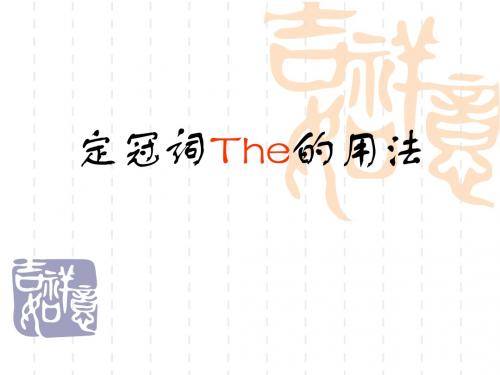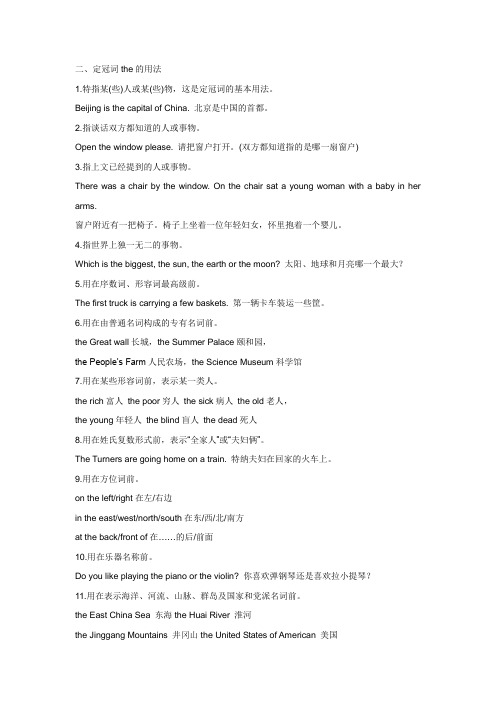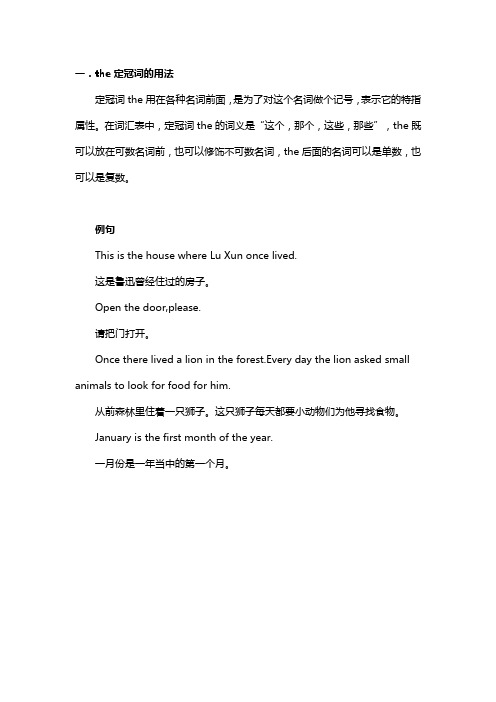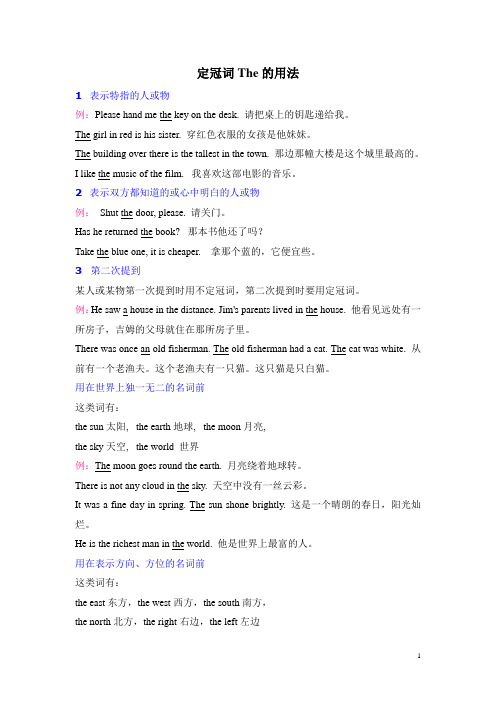定冠词the的用法
定冠词The的用法

7.用于江湖,海洋,海峡,山脉,群 岛,建筑物之前
Eg: The Great Wall
The Yellow River
The Pacific Ocean The Bird`s nest Stadium
8.用于有普通名词构成的专有名词前
Eg: The United States America The United Kingdom The stone Age
Eg: Open the window,please!
Can you give me the knife beside you?
3.用于世界上独一无二的事物
Eg:
The sun
The earth The moon
4.表示方位的名词前
Eg: The east The west
9.用于复数姓氏之前,表示全家
Eg: The Smiths The Blacks The Greens
10.用于西洋乐器和发明物之前
Eg: The piano The violin The compass was invited in China.
定冠词“the”的用法

二、定冠词the的用法1.特指某(些)人或某(些)物,这是定冠词的基本用法。
Beijing is the capital of China. 北京是中国的首都。
2.指谈话双方都知道的人或事物。
Open the window please. 请把窗户打开。
(双方都知道指的是哪一扇窗户)3.指上文已经提到的人或事物。
There was a chair by the window. On the chair sat a young woman with a baby in her arms.窗户附近有一把椅子。
椅子上坐着一位年轻妇女,怀里抱着一个婴儿。
4.指世界上独一无二的事物。
Which is the biggest, the sun, the earth or the moon? 太阳、地球和月亮哪一个最大?5.用在序数词、形容词最高级前。
The first truck is carrying a few baskets. 第一辆卡车装运一些筐。
6.用在由普通名词构成的专有名词前。
the Great wall长城,the Summer Palace颐和园,the People’s Farm人民农场,the Science Museum科学馆7.用在某些形容词前,表示某一类人。
the rich富人the poor穷人the sick病人the old老人,the young年轻人the blind盲人the dead死人8.用在姓氏复数形式前,表示“全家人”或“夫妇俩”。
The Turners are going home on a train. 特纳夫妇在回家的火车上。
9.用在方位词前。
on the left/right在左/右边in the east/west/north/south在东/西/北/南方at the back/front of在……的后/前面10.用在乐器名称前。
Do you like playing the piano or the violin? 你喜欢弹钢琴还是喜欢拉小提琴?11.用在表示海洋、河流、山脉、群岛及国家和党派名词前。
the定冠词的用法

一.the定冠词的用法
定冠词the用在各种名词前面,是为了对这个名词做个记号,表示它的特指属性。
在词汇表中,定冠词the的词义是“这个,那个,这些,那些”,the既可以放在可数名词前,也可以修饰不可数名词,the后面的名词可以是单数,也可以是复数。
例句
This is the house where Lu Xun once lived.
这是鲁迅曾经住过的房子。
Open the door,please.
请把门打开。
Once there lived a lion in the forest.Every day the lion asked small animals to look for food for him.
从前森林里住着一只狮子。
这只狮子每天都要小动物们为他寻找食物。
January is the first month of the year.
一月份是一年当中的第一个月。
定冠词the的用法及例句

定冠词the的用法及例句在英语中,定冠词”the”是一个常见且重要的语法元素,它用来特指某个特定的事物或者人。
掌握好定冠词”the”的用法能够帮助我们更准确地表达意思,下面将介绍定冠词”the”的用法及一些例句。
1. 特指特定的事物或人定冠词”the”通常用于特指我们已经知道或者提到过的特定事物或者人。
例如: - I want to go to the park tomorrow.(我明天想去那个公园。
) - Have you seen the book I was reading yesterday?(你看到昨天我在看的那本书了吗?)2. 特指独一无二的事物或人当我们讨论的事物或者人是独一无二的时候,通常要使用定冠词”the”。
例如: - The sun rises in the east.(太阳从东方升起。
) - She is going to visit the President next week.(她下周将拜会总统。
)3. 特指双方或者全体在某些情况下,定冠词”the”也用于特指一组人或者事物的双方或者全体。
例如: - The students worked hard for the exam.(学生们为了考试而努力学习。
) - The two teams played against each other fiercely.(两支队伍激烈对抗。
)4. 特指具体的地区或者方向当我们提到特定的地区或者方向时,通常要使用定冠词”the”。
例如: - They went to the mountains for hiking last summer.(他们去山区徒步旅行了去年夏天。
) - The east side of the city is known for its beautiful scenery.(这座城市的东部以其美丽的风景而闻名。
)5. 特指已经提到的人或事定冠词”the”还常用于指代之前提到过的人或者事物。
关于定冠词the的用法

关于定冠词the的用法一、定冠词the的基本用法及意义在英语中,定冠词the是最常见的冠词之一,通常用于特指某个或某些事物。
使用定冠词the有以下几个基本原则:1. 特指唯一的人或事物:当我们需要表达特指某个唯一的人或事物时,经常会使用定冠词the。
例如,“The sun”(太阳)和“The Queen of England”(英国女王)。
2. 特指被提及过的人或事物:如果一个人或事物已经在对话或文章中被提及过,我们可以使用定冠词the来表示特指。
例如,“I saw a girl in the park. The girl was carrying a red umbrella.”(我在公园里看到了一个女孩。
那个女孩拿着一把红色伞。
)3. 特指已知的人或事物:当读者/听众已经知晓具体是哪个人或哪件事物时,我们使用定冠词the来表示特指。
例如,“The car you parked in front of my house.”(你停在我家前面的那辆车。
)4. 指特定类别中的全体成员:当我们需要表达某个类别中所有成员时,可以使用定冠词the。
例如,“The dog is a loyal animal.”(狗是忠实的动物。
)5. 用于特定的地点名称:当提及特定的地点名称时,我们使用定冠词the。
例如,“I went to the cinema.”(我去了电影院。
)6. 用于序数词和形容词最高级前:在表达顺序或比较时,常常会在序数词和形容词最高级前使用定冠词the。
例如,“He came in the first place.”(他获得了第一名。
)和“She is the tallest girl in the class.”(她是班上最高的女生。
)二、与其他冠词或零冠词的区别除了定冠词the外,英语中还有不定冠词a/an以及零冠词(即没有任何冠词)。
这些冠词用法与定冠词the有所不同。
1. 不定冠词a/an:不定冠词用于泛指或表示数量不确定的人或事物。
the的用法总结

the的用法总结
1. the作为定冠词用于特指某人或某物,常放在名词前面,用于表示特定的人或事物。
例如:The boy is playing with the dog.
2. the也用于表示上文中提到过的人或事物。
例如:John has a car. The car is red.
3. the用于表示独一无二的事物或事物的整体。
例如:the sun, the moon, the earth
4. the用于表示已知的或上下文中讨论过的人或事物。
例如:I saw the movie yesterday. The movie was great.
5. the用于表示某个对象属于某一类别。
例如:The cat is a mammal.
6. the用于表示一些特定的群体或集合。
例如:the rich, the poor
7. the用于表示已提及的或知名的事物或人。
例如:The Mona Lisa, The Beatles
8. the用于表示某人在特定职位上。
例如:the President, the Queen
需要注意的是,在某些情况下,名词前面也可以不使用the,这取决于具体的语境和语法规则。
因此,对于the的使用还需结合具体句子和上下文进行理解和判断。
关于定冠词the的用法口诀

关于定冠词the的用法口诀定冠词"The"是英语中非常常见的一个词。
它的用法虽然简单,但也有一些规则需要掌握。
下面将介绍关于定冠词"The"的用法口诀。
一、特指事物"The"用于特指某一事物,即强调特定的人或物。
这种使用方式可以理解为我们在谈论已经知道和具体的人或物时所用。
例如,在谈论特定的电视节目时,我们会说:“Did you watch the TV show last night?”而不是“Did you watch a TV show last night?”因为此处我们明确指的是“那个”电视节目。
同样地,在谈论某座著名建筑时,我们会说:“I visited the Statue of Liberty.”而不是“I visited a Statue of Liberty.”因为大家都知道这座建筑。
这种使用方式通常出现在独一无二或众所周知的名词前面。
注意,“The”只能与单数名词或复数名词同时使用。
二、序号次序当我们提到某个位置上的事物时,也需要使用“The”。
比如:1. “I am going to the third building on the left.”2. “He is interested in the fourth book on the shelf.”在上述句子中,“the third building”和“the fourth book”表示具体位置上的第三个建筑和第四本书。
三、乐器与音乐作品定冠词“The”还用于特指某个乐器或音乐作品时。
下面是一些例子:1. “She is learning to play the piano.”2. “I enjoy listening to the Beatles’ music.”在这两个例句中,“the piano”表示具体的钢琴,而“the Beatles’ music”则指的是具体的音乐作品。
定冠词The的用法

定冠词The的用法1表示特指的人或物例:Please hand me the key on the desk. 请把桌上的钥匙递给我。
The girl in red is his sister. 穿红色衣服的女孩是他妹妹。
The building over there is the tallest in the town. 那边那幢大楼是这个城里最高的。
I like the music of the film. 我喜欢这部电影的音乐。
2表示双方都知道的或心中明白的人或物例:Shut the door, please. 请关门。
Has he returned the book? 那本书他还了吗?Take the blue one, it is cheaper. 拿那个蓝的,它便宜些。
3 第二次提到某人或某物第一次提到时用不定冠词,第二次提到时要用定冠词。
例:He saw a house in the distance. Jim's parents lived in the house. 他看见远处有一所房子,吉姆的父母就住在那所房子里。
There was once an old fisherman. The old fisherman had a cat. The cat was white. 从前有一个老渔夫。
这个老渔夫有一只猫。
这只猫是只白猫。
用在世界上独一无二的名词前这类词有:the sun太阳, the earth地球, the moon月亮,the sky天空, the world 世界例:The moon goes round the earth. 月亮绕着地球转。
There is not any cloud in the sky. 天空中没有一丝云彩。
It was a fine day in spring. The sun shone brightly. 这是一个晴朗的春日,阳光灿烂。
- 1、下载文档前请自行甄别文档内容的完整性,平台不提供额外的编辑、内容补充、找答案等附加服务。
- 2、"仅部分预览"的文档,不可在线预览部分如存在完整性等问题,可反馈申请退款(可完整预览的文档不适用该条件!)。
- 3、如文档侵犯您的权益,请联系客服反馈,我们会尽快为您处理(人工客服工作时间:9:00-18:30)。
用定冠词
1.特指某(些)人或某(些)事物,以区别于同类中的其他人或事物。
The book on the desk is mine.
Show me the photo of the boy, please.
2.指说话双方都知道的人或事物。
Open the door, please. 请开门。
Did you see the boy? 你看见那个男孩了吗?
What’s the new teacher’s name?新老师的名字叫什么?
3.指上文提到的人或事物。
He lives on a farm. The farm is not big. 他住在农场,这农场不大。
There are some dogs. The dogs are very lovely. 这儿有一些狗。
这些狗很可爱。
4.用在世界上独一无二的事物。
The sun is bigger than the moon. 太阳比月亮大些。
(star不是独一无二的)
但这些名词作为描绘性定语时,可用不定冠词。
Look! A red sun is rising. 瞧!一轮红日正在升起。
5.用在单数名词前,表示一类人或物、
The money is a clever animal. 猴子是一种聪明的动物。
6.用在序数词和形容词最高级前。
The first island is the biggest of the three. 个小岛是三个中最大的。
7.由普通名词构成的国家、单位、机关、团体、党派等专有名词以及江河、海洋、山
脉、群岛、海峡、海湾等专有名词。
They will visit the Great Wall next week.
They came to the United States of America last year.
The Communist Party of China was founded on July 1st, 1921.
The Yellow River is the second longest river in China.
8.在形容表示一类人,the +形容词,形容词名词化,通常指一群人,是复数。
作主
语时,其后动词应用复数形式。
The old are sick.
Amy always helps the poor.
9.用在姓名复数形式前表示一家人,是复数。
The Smiths have moved to London.
The Browns are very kind to us.
10.用在乐器名称、文艺活动、运动场所前。
Sarah likes to play the piano very much.
11.用在某些习惯用语中。
in the morning, on the left, the day before yesterday,
all the same, all the tim e
不用定冠词
1.姓名、称呼、头衔前。
Mr. Li is our headmaster. 李先生是我们的校长。
After lunch Aunt Huang came in. 午饭后黄阿姨来了。
2.季节、月份、星期、节日前一般不用冠词。
It’s Sunday today. 今天是星期天。
He was born on June 12, 1999. 他出生于1999年6月12日。
Today is Father’s Day. 今天是父亲节。
If winter comes, can spring be far behind? 冬天来了,春天还会远吗?
但是中国传统节日前习惯用冠词。
All of us like the spring festival. 我们喜欢春节。
但是如果被一个限制性定语修饰或有表示继续的介词during, through时与表示一段特定的时间,则在季节前要加定冠词。
She came to Shanghai in the spring of 1987.她是一九八七年春天来上海的。
The school was completed in the September of 2000.这学校是2000年9月落成的。
He swims every day during the summer. 他夏天的每一天都游泳。
虽不特指某一年的季节,但说话人把某季节看作一年的一部分,即一年的某一段时间。
则在季节前要加定冠词。
We play football in the winter.
3.各词复数表示一类人或事物时。
但若各词复数被一个限制性定语修饰,则要加定冠
词the。
I like cakes very much. 我非常喜欢蛋糕。
My father and mother are the doctors in People’s Hospital of Shanghai.
4.在三餐饭前
He had supper with us yesterday. It’s a very good supper.他昨天和我们吃晚饭,这是一顿丰盛的晚餐。
5.球类运动、棋类游戏,学科名称的名词前。
但若表示某一种或某一个特定的概念时
用冠词。
My brother likes to play football.我兄弟喜欢踢足球。
Let’s go and watch them play chess. 让我们去看他们下棋。
6.在语言名称前。
Mike can speak Chinese.
7.在专有名词(人名,简称的国家、地名)、物质名词、抽象名词、不可数名词前。
但
若不可数各词有其它限制词修饰时,则要加定冠词the。
Smith is our teacher. 史密思是我们的老师。
Milk is good for us. 牛奶对我们有好处。
The water in the pool is very dirty. 坑里的水很脏。
8.名词前已有作定语的指示代词(this、that、these、those)、物主代词(my、your、
his)、不定代词(some、any、every、each)等限定词时。
Come this way, please.
I’ve some question to ask you.
My brother is a student.
the的读音
后面跟元音则发ði 或ði: ,辅音则发ðə。
